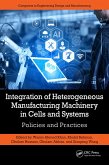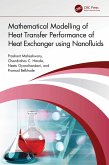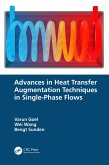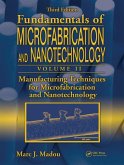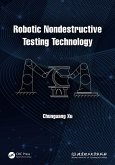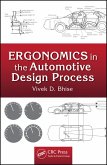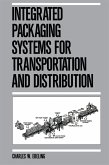Integration of Heterogeneous Manufacturing Machinery in Cells and Systems (eBook, PDF)
Policies and Practices
Redaktion: Ahmed Khan, Wasim; Wang, Xiaoping; Abbas, Ghulam; Hussain, Ghulam; Rehman, Khalid
52,95 €
52,95 €
inkl. MwSt.
Sofort per Download lieferbar

26 °P sammeln
52,95 €
Als Download kaufen

52,95 €
inkl. MwSt.
Sofort per Download lieferbar

26 °P sammeln
Jetzt verschenken
Alle Infos zum eBook verschenken
52,95 €
inkl. MwSt.
Sofort per Download lieferbar
Alle Infos zum eBook verschenken

26 °P sammeln
Integration of Heterogeneous Manufacturing Machinery in Cells and Systems (eBook, PDF)
Policies and Practices
Redaktion: Ahmed Khan, Wasim; Wang, Xiaoping; Abbas, Ghulam; Hussain, Ghulam; Rehman, Khalid
- Format: PDF
- Merkliste
- Auf die Merkliste
- Bewerten Bewerten
- Teilen
- Produkt teilen
- Produkterinnerung
- Produkterinnerung

Bitte loggen Sie sich zunächst in Ihr Kundenkonto ein oder registrieren Sie sich bei
bücher.de, um das eBook-Abo tolino select nutzen zu können.
Hier können Sie sich einloggen
Hier können Sie sich einloggen
Sie sind bereits eingeloggt. Klicken Sie auf 2. tolino select Abo, um fortzufahren.

Bitte loggen Sie sich zunächst in Ihr Kundenkonto ein oder registrieren Sie sich bei bücher.de, um das eBook-Abo tolino select nutzen zu können.
Integration of Heterogenous Manufacturing Machinery in Cells and Systems: Policies and Practices focuses on the methods covering the use of Artificial Intelligence, Augmented Reality, the Internet of Things, and cellular and physical industrial communication.
- Geräte: PC
- mit Kopierschutz
- eBook Hilfe
Andere Kunden interessierten sich auch für
![Integration of Heterogeneous Manufacturing Machinery in Cells and Systems (eBook, ePUB) Integration of Heterogeneous Manufacturing Machinery in Cells and Systems (eBook, ePUB)]() Integration of Heterogeneous Manufacturing Machinery in Cells and Systems (eBook, ePUB)52,95 €
Integration of Heterogeneous Manufacturing Machinery in Cells and Systems (eBook, ePUB)52,95 €![Mathematical Modelling of Heat Transfer Performance of Heat Exchanger using Nanofluids (eBook, PDF) Mathematical Modelling of Heat Transfer Performance of Heat Exchanger using Nanofluids (eBook, PDF)]() Prashant MaheshwaryMathematical Modelling of Heat Transfer Performance of Heat Exchanger using Nanofluids (eBook, PDF)48,95 €
Prashant MaheshwaryMathematical Modelling of Heat Transfer Performance of Heat Exchanger using Nanofluids (eBook, PDF)48,95 €![Advances in Heat Transfer Augmentation Techniques in Single-Phase Flows (eBook, PDF) Advances in Heat Transfer Augmentation Techniques in Single-Phase Flows (eBook, PDF)]() Varun GoelAdvances in Heat Transfer Augmentation Techniques in Single-Phase Flows (eBook, PDF)52,95 €
Varun GoelAdvances in Heat Transfer Augmentation Techniques in Single-Phase Flows (eBook, PDF)52,95 €![Manufacturing Techniques for Microfabrication and Nanotechnology (eBook, PDF) Manufacturing Techniques for Microfabrication and Nanotechnology (eBook, PDF)]() Marc J. MadouManufacturing Techniques for Microfabrication and Nanotechnology (eBook, PDF)135,95 €
Marc J. MadouManufacturing Techniques for Microfabrication and Nanotechnology (eBook, PDF)135,95 €![Robotic Nondestructive Testing Technology (eBook, PDF) Robotic Nondestructive Testing Technology (eBook, PDF)]() Chunguang XuRobotic Nondestructive Testing Technology (eBook, PDF)48,95 €
Chunguang XuRobotic Nondestructive Testing Technology (eBook, PDF)48,95 €![Ergonomics in the Automotive Design Process (eBook, PDF) Ergonomics in the Automotive Design Process (eBook, PDF)]() Vivek D. BhiseErgonomics in the Automotive Design Process (eBook, PDF)115,95 €
Vivek D. BhiseErgonomics in the Automotive Design Process (eBook, PDF)115,95 €![Integrated Packaging Systems for Transportation and Distribution (eBook, PDF) Integrated Packaging Systems for Transportation and Distribution (eBook, PDF)]() Charles W. EbelingIntegrated Packaging Systems for Transportation and Distribution (eBook, PDF)67,95 €
Charles W. EbelingIntegrated Packaging Systems for Transportation and Distribution (eBook, PDF)67,95 €-
-
-
Integration of Heterogenous Manufacturing Machinery in Cells and Systems: Policies and Practices focuses on the methods covering the use of Artificial Intelligence, Augmented Reality, the Internet of Things, and cellular and physical industrial communication.
Dieser Download kann aus rechtlichen Gründen nur mit Rechnungsadresse in A, B, BG, CY, CZ, D, DK, EW, E, FIN, F, GR, HR, H, IRL, I, LT, L, LR, M, NL, PL, P, R, S, SLO, SK ausgeliefert werden.
Produktdetails
- Produktdetails
- Verlag: Taylor & Francis eBooks
- Seitenzahl: 270
- Erscheinungstermin: 13. Juni 2024
- Englisch
- ISBN-13: 9781040034347
- Artikelnr.: 70483103
- Verlag: Taylor & Francis eBooks
- Seitenzahl: 270
- Erscheinungstermin: 13. Juni 2024
- Englisch
- ISBN-13: 9781040034347
- Artikelnr.: 70483103
- Herstellerkennzeichnung Die Herstellerinformationen sind derzeit nicht verfügbar.
Professor Dr. Wasim A. Khan Wasim A. Khan has researched and developed industrial scale subtractive and additive manufacturing machine tools, measurement, and testing machines as well as digital controllers for this equipment. He is instrumental in policies and framework development related to manufacturing of discrete products in small, medium, and large-scale manufacturing enterprises at national level. Dr. Wasim is a life member of Pakistan Engineering Council, a chartered engineer of Engineering Council, UK and a fellow of Institution of Mechanical Engineers, UK. He is also a senior member of IEEE, USA. He is currently acting as Professor of Operations Research at the GIK Institute of Engineering Sciences and Technology, Pakistan. Dr. Khalid Rahman Khalid Rahman is an Associate Professor in the Faculty of Mechanical Engineering at Ghulam Ishaq Khan Institute of Engineering Sciences and Technology where he has been a faculty member since 2012. He received his BS in Mechanical Engineering from Ghulam Ishaq Khan Institute of Engineering Sciences and Technology, MS and PhD degree from Jeju National University, South Korea in 2012. He also has industrial experience of seven years in design and manufacturing. His research interests include printing technologies, and he is currently working on Direct Ink Write and Electrohydrodynamic inkjet printing for fabrication of electronics devices and sensors and applications. Professor Dr. Ghulam Hussain Dr. Ghulam Hussain is a professor of mechanical engineering at the University of Bahrain, Bahrain. He has rich experience of both academia and industry. He is an expert of manufacturing technologies with expertise in plasticity, sustainability, and advanced processes including 3D printing, incremental forming, friction welding and hybridization. He is the author of over 100 top-notch journal articles and an editor of several books. He is recognized among the top 10 leading researchers at the international as well as national level. He has been ranked as the world's top 2% scientist by Stanford University, USA. He is the winner of many research and teaching awards/prizes. He is actively involved with several reputed international universities as a foreign expert and external researcher. Dr. Ghulam Abbas GHULAM ABBAS received the B.S. degree in computer science from University of Peshawar, Pakistan, in 2003, and the M.S. degree in distributed systems and the Ph.D. degree in computer networks from the University of Liverpool, U.K., in 2005 and 2010, respectively. From 2006 to 2010, he was Research Associate with Liverpool Hope University, U.K., where he was associated with the Intelligent & Distributed Systems Laboratory. Since 2011, he has been with the Faculty of Computer Sciences & Engineering, GIK Institute of Engineering Sciences and Technology, Pakistan. He is currently working as Professor and Director Huawei ICT Academy. Dr. Abbas is a Co-Founding Member of the Telecommunications and Networking Research Center at GIK Institute. He is a Fellow of the Institute of Science & Technology, U.K., a Fellow of the British Computer Society, and a Senior Member of the IEEE. His research interests include computer networks and wireless and mobile communications. Professor Dr. Wang Xiaoping Wang Xiaoping is a professor at college of Electrical and Mechanical Engineering, Nanjing University of Aeronautics and Astronautics, a senior member of Chinese Mechanical Engineering Association, a senior member of Aeronautical Society, a guest editor of international journal IJCAT, an editorial board member of American Journal of Software Engineering and Applications, and an evaluation expert of postgraduate dissertation of Ministry of Education. His main research areas include digital design and manufacturing, and intelligent manufacturing. The current research interests are reverse engineering, aerial measurement, geodetic model reconstruction (3D reconstruction); composite material fiber laying process / robot road planning; NC machining tool rail planning / material reduction and material increase manufacturing path optimization; CAD software system integration and algorithm; mathematical modeling; Other theoretical and technical issues related to mechanical design and manufacturing. He has executed several research projects funded by national agencies. He is also winner of 3 National Defense Science and Technology Progress Awards, 1 Provincial Award and 1 Municipal Award. He has published more than 80 research articles in renowned journals and has 2 patents to his credit.
PART 1 Policies and Practices 1. An Overview of National SME Policy - 2021.
2.IMS Framework for N11 and D8 Countries PART 2 Modern Control Theory 3.
Integrating Fault Tolerance in Feedback Control Systems PART 3 Functional
Reverse Engineering of Controller 4. Design and Development of 3-Axis Wire
Arc Additive Manufacturing Machine: Functional Reverse Engineering Approach
. 5. Reverse Engineering of a 6 DOF Industrial Robotic Arm for Advanced
Manufacturing Processes. 6. Controller Design for a Six Degree of Freedom
Parallel Robotic Machining Bed 7. Surface Normal Trajectory Generation for
Robotic-Based Machining Operation on Curved Surface PART 4 4th Industrial
Revolution 8. Applications of Digital Twins in the Development of a
Predictive Maintenance System 9. Artificial Immune-Inspired Disruption
Handling in Manufacturing Process. 10. Cyber Security in Additive
Manufacturing 11. Metal Forming in Industry 4.0 Epoch: Challenges and
Opportunities 12. 3D Surface Reconstruction of Aluminum Alloy Arc Additive
Manufacturing Parts Based on Focused Topography Measurement. PART 5
Prodution Philosophies and 4th Industrial Revolution 13. Best Practices for
Mitigating Supply Chain Risks in Industrial IoT 14. Machine Intelligence
for Agile Manufacturing 15. Role of Quantum Security in the Future of Smart
Manufacturing
2.IMS Framework for N11 and D8 Countries PART 2 Modern Control Theory 3.
Integrating Fault Tolerance in Feedback Control Systems PART 3 Functional
Reverse Engineering of Controller 4. Design and Development of 3-Axis Wire
Arc Additive Manufacturing Machine: Functional Reverse Engineering Approach
. 5. Reverse Engineering of a 6 DOF Industrial Robotic Arm for Advanced
Manufacturing Processes. 6. Controller Design for a Six Degree of Freedom
Parallel Robotic Machining Bed 7. Surface Normal Trajectory Generation for
Robotic-Based Machining Operation on Curved Surface PART 4 4th Industrial
Revolution 8. Applications of Digital Twins in the Development of a
Predictive Maintenance System 9. Artificial Immune-Inspired Disruption
Handling in Manufacturing Process. 10. Cyber Security in Additive
Manufacturing 11. Metal Forming in Industry 4.0 Epoch: Challenges and
Opportunities 12. 3D Surface Reconstruction of Aluminum Alloy Arc Additive
Manufacturing Parts Based on Focused Topography Measurement. PART 5
Prodution Philosophies and 4th Industrial Revolution 13. Best Practices for
Mitigating Supply Chain Risks in Industrial IoT 14. Machine Intelligence
for Agile Manufacturing 15. Role of Quantum Security in the Future of Smart
Manufacturing
PART 1 Policies and Practices 1. An Overview of National SME Policy - 2021.
2.IMS Framework for N11 and D8 Countries PART 2 Modern Control Theory 3.
Integrating Fault Tolerance in Feedback Control Systems PART 3 Functional
Reverse Engineering of Controller 4. Design and Development of 3-Axis Wire
Arc Additive Manufacturing Machine: Functional Reverse Engineering Approach
. 5. Reverse Engineering of a 6 DOF Industrial Robotic Arm for Advanced
Manufacturing Processes. 6. Controller Design for a Six Degree of Freedom
Parallel Robotic Machining Bed 7. Surface Normal Trajectory Generation for
Robotic-Based Machining Operation on Curved Surface PART 4 4th Industrial
Revolution 8. Applications of Digital Twins in the Development of a
Predictive Maintenance System 9. Artificial Immune-Inspired Disruption
Handling in Manufacturing Process. 10. Cyber Security in Additive
Manufacturing 11. Metal Forming in Industry 4.0 Epoch: Challenges and
Opportunities 12. 3D Surface Reconstruction of Aluminum Alloy Arc Additive
Manufacturing Parts Based on Focused Topography Measurement. PART 5
Prodution Philosophies and 4th Industrial Revolution 13. Best Practices for
Mitigating Supply Chain Risks in Industrial IoT 14. Machine Intelligence
for Agile Manufacturing 15. Role of Quantum Security in the Future of Smart
Manufacturing
2.IMS Framework for N11 and D8 Countries PART 2 Modern Control Theory 3.
Integrating Fault Tolerance in Feedback Control Systems PART 3 Functional
Reverse Engineering of Controller 4. Design and Development of 3-Axis Wire
Arc Additive Manufacturing Machine: Functional Reverse Engineering Approach
. 5. Reverse Engineering of a 6 DOF Industrial Robotic Arm for Advanced
Manufacturing Processes. 6. Controller Design for a Six Degree of Freedom
Parallel Robotic Machining Bed 7. Surface Normal Trajectory Generation for
Robotic-Based Machining Operation on Curved Surface PART 4 4th Industrial
Revolution 8. Applications of Digital Twins in the Development of a
Predictive Maintenance System 9. Artificial Immune-Inspired Disruption
Handling in Manufacturing Process. 10. Cyber Security in Additive
Manufacturing 11. Metal Forming in Industry 4.0 Epoch: Challenges and
Opportunities 12. 3D Surface Reconstruction of Aluminum Alloy Arc Additive
Manufacturing Parts Based on Focused Topography Measurement. PART 5
Prodution Philosophies and 4th Industrial Revolution 13. Best Practices for
Mitigating Supply Chain Risks in Industrial IoT 14. Machine Intelligence
for Agile Manufacturing 15. Role of Quantum Security in the Future of Smart
Manufacturing

